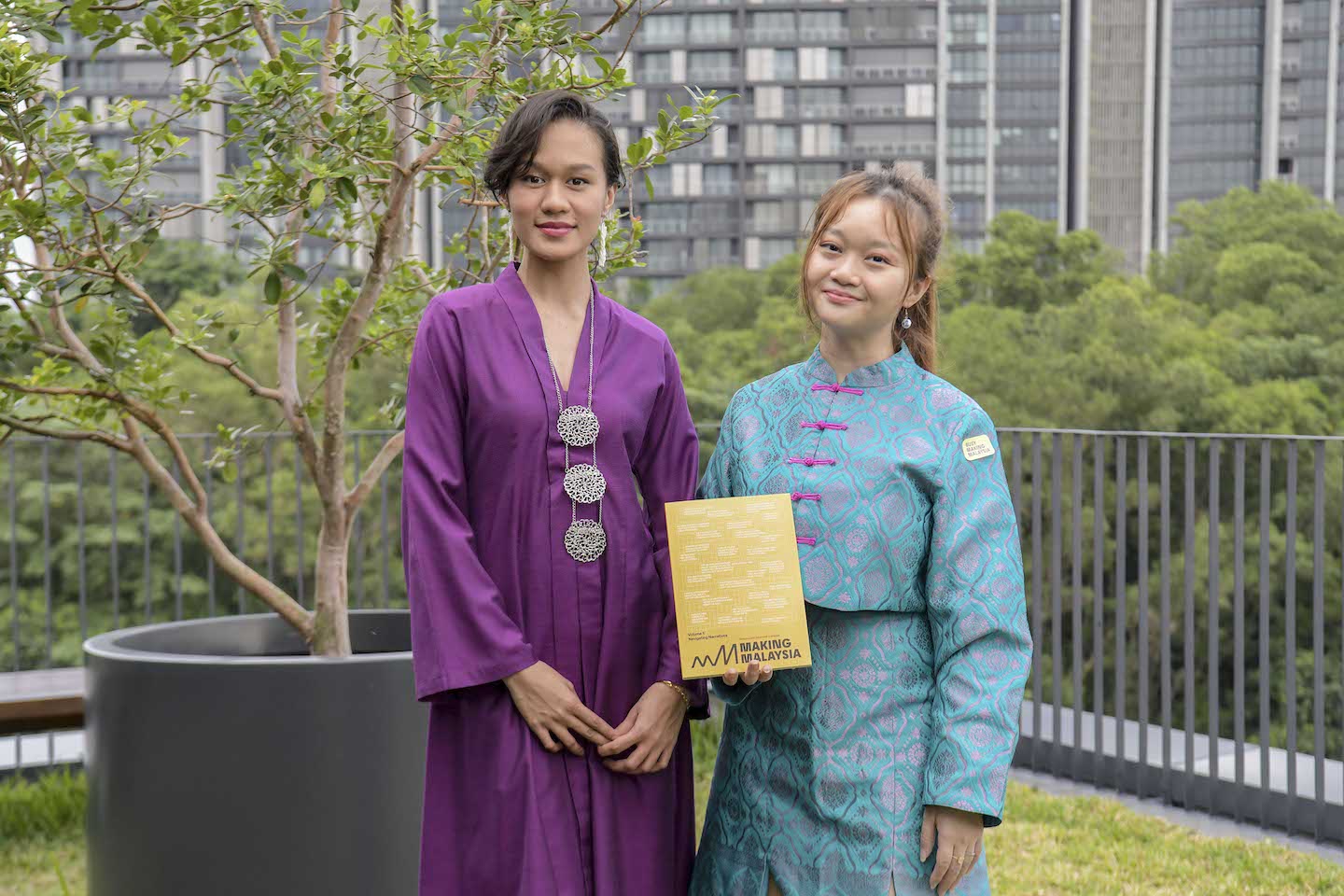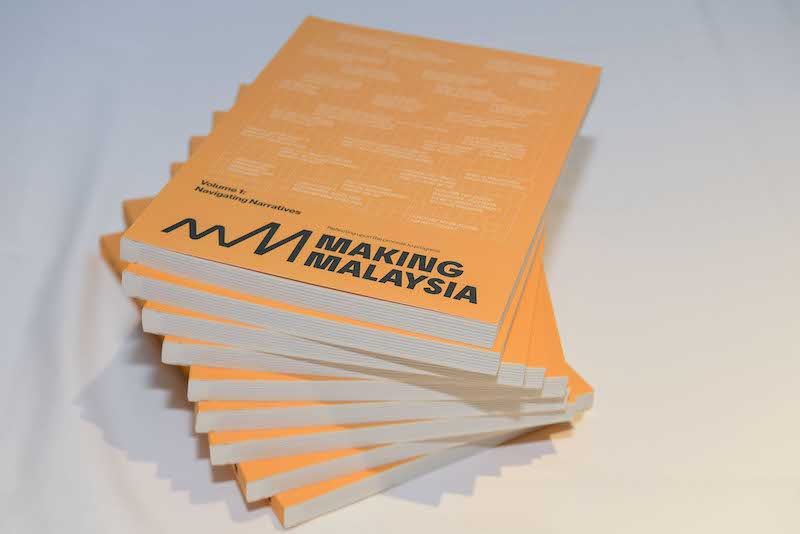
Raisa Albar (left) and Queenie Wong (All photos: Shahrill Basri/The Edge)
What makes a country, if not its people? To reduce the human experience to simplistic labels and stereotypes is to mistake its very nature, which is both complex and dynamic. Culture, history, language, religion and psychological affinity form the building blocks of personal quiddity and, in a wider context, the bedrock of a country. So, to truly understand its identity is to delve into the intricate nuances of individual lives and recognise the boundless diversity that exists in every society.
For R+, the strategic design research unit of multidisciplinary firm GDP Architects, one way to steer through the social labyrinth is initiating comprehension at the idiosyncratic level, examining a person’s story and the ways meaningful impact begin from the self. The approach is a natural progression from familiar territory, since one of the team’s principal tasks at the firm is responding to queries about social behaviour, collecting data, then analysing and reporting on it to inform projects as well as give grounds and justification for design and architectural recommendations.
“If a client wants to build an office, we answer questions such as, ‘Do you think working from home will still be relevant in 10 years?’ We do the research, see what the particular market is like, what is around the site and present what we think might work or suggest alternative programmes. Unpacking what was happening in society kind of informed the way we learned,” says Queenie Wong, a design strategist at R+.
20240912_peo_book_launch_making_malaysia_sb_8.jpg

The department was properly formed during the pandemic in 2020 when GDP, whose projects span the Tun Razak Exchange development, the Ministry of Finance office and The Troika (together with Foster + Partners), realised it needed a dedicated team to gather findings that were applicable to the Malaysian way of life.
“To have a better understanding, we need localised qualitative and quantitative data. For example, if we want to build for the Gen Zs in KL, we need to know what they’re like. Global trends might say they are more individualistic or family to them is not as important. But from what we gather in the context of Malaysians in KL, family still comes first, though when they think about community, it’s more friends than family,” Wong points out.
“Two key words that shape our work are ‘relevance’ and ‘reliability’,” says Raisa Albar, a fellow strategist. Overgeneralising without localising is a big no-no.
R+ also initiates its own research projects about Malaysian society. “Our main passion is sharing our findings through various creative outputs, such as exhibitions and events, to carve a space for discussion and understanding,” says Wong.
Making Malaysia: Volume 1 Navigating Narratives is its latest undertaking. “What we’re trying to bring forth in this book are the values and spirit of what it means to be Malaysian. It is very rare to find something that captures the minds of how Malaysians think because it’s very nuanced,” Raisa explains.
“We thought that narratives would be a good place to start because to understand people is to understand how they talk about things,” says Wong. R+’s debut publication zooms into the work of six creatives stemming from fields such as fashion, film and art, whose metier revolves around being storytellers themselves. “We thought it would be best to start with industries in the business of shaping narratives,” says Wong.
20240912_peo_book_launch_making_malaysia_sb_5.jpg

The people featured are designer Kel Wen of local label Behati; filmmakers Junad M Nor and Nadirah Zakariya, founders of creative studio Layar Lucida; graphic designer and visual artist Ejin Sha of her eponymous studio; Lau Hoe Yin (also known as Blink), Edwin Raj and Zulamran Hilmi of creative media agency 33.3; Nur Nadhrah and Shamin “Sam” Sahrum of art and spatial design agency No-To-Scale*; and independent art curator Sharmin Parameswaran.
Wong, who is lead editor of Making Malaysia, explains that the project took shape over the course of a few years. “There was a weird juxtaposition in 2020. There was a pandemic, change in government, bad floods and the Kita Jaga Kita movement. It all happened within the year that we were promised a futuristic Wawasan 2020. It was very jarring and made us question what progress really meant to us. While it could mean something different to others, we think progress is embodied by the day-to-day Malaysians trying to make an impact in their own fields,” she says.
The idea evolved into an investigation of the psyche, struggles and decision-making processes of the featured personalities. “We analysed their work, social media and literally studied them. Some of them were actually quite shocked by what we found. We don’t only talk about their work but also contextualise it to what our society was going through at the time,” Wong continues.
It can also be regarded as a form of documentation. “When they approached us, they presented us with what we did in the past, what we did individually, even before we were officially a collective,” says Nadirah, offering her perspective as one of the subjects.
“It was really good for us to pause and think about our own processes. It is also an opportunity to allow other brains and creatives to dissect our work and pick up things we didn’t realise ourselves. It was interesting to see how people perceived us.”
Junad says: “They were, in a way, archiving our work.”
Sharmin shares a similar sentiment. “I’ve been curating art since 2012 and have done and said a lot of things I don’t remember. It was good to sort of take stock of how I got to where I am. I get to look back and see how I’ve grown (or not).
“I document myself all the time on Instagram, but there is a difference between what you think of yourself and what people think of you. And that is what art is about. We express, but someone else can interpret it in their own way.
“The team has managed to somehow translate 12 years of my life and work into visuals and text. I think they did a good job: one, in capturing what all of us have done; and two, in presenting it.”
20240912_peo_book_launch_making_malaysia_sb_15.jpg

The plan does not stop there. R+ is already working on a second volume, titled Leading Legacies. “We’re looking at people or business owners who have inherited something and how they’re making it their own,” assistant lead editor Raisa discloses.
Wong says: “It can be something that was passed down, like a building. Others might inherit a business, craft or recipe. I think what’s interesting is seeing how people deal with this differently. What they keep or innovate on and the core values they hold on to.”
The personalities featured in the upcoming volume include Ee Soon Wei, CEO of printing factory turned creative and retail hub APW Bangsar; siblings Carmen, Kelly and Joe Lau of specialty dessert cafe Dáo; and David Tseng of premium grocer Qra.
Making Malaysia is meant to redefine the general understanding of success and how we understand our country. “Remembering what you do is important. Building a country sounds very far-fetched, but what you do has an impact. The direction you take involves and affects more people than you think,” summarises Raisa.
After all, even a small drop of water can form large ripples.
This article first appeared on Nov 25, 2024 in The Edge Malaysia.


